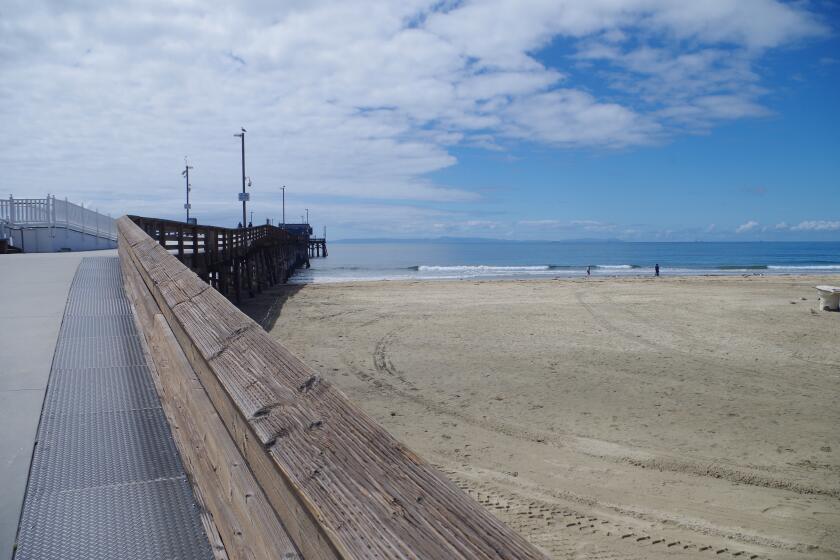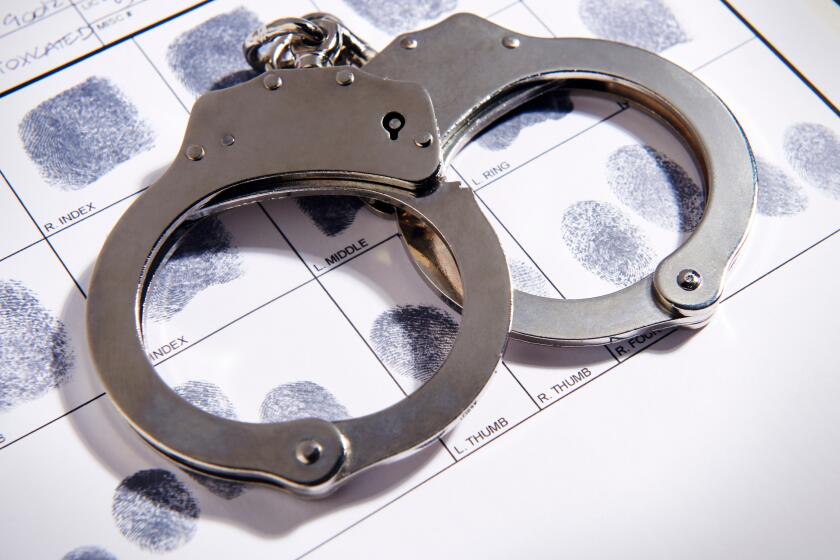Back from the brink
- Share via
Bryce Alderton
The car slid, caromed off the curb, tumbled 50 feet down a mountain
side, flipped a few times and came to rest upside down.
Alex Pisarski gazed down at his right hand, bright red from the
blood that poured toward the earth.
Nearly five months later, a scar two inches long is clearly
visible on the back of Pisarski’s left hand, a reminder of the
morning of December 13, when a snowboarding trip to Big Bear turned
into a fight for survival.
Pisarski, 17, the Costa Mesa High baseball team’s leadoff hitter
and third baseman this season, as well as Zach Morton, a Mesa junior
varsity player who has seen limited varsity action this season, had
nearly reached their mountain destination about 6 a.m. on that
overcast morning. It wasn’t snowing when a curve changed their lives
forever.
Pisarski, driving his 1991 Toyota 4-Runner, started to make a
right turn when the back end of the vehicle slid out. Morton was
asleep.
The car hit the curb, rolled several times and fell off the edge,
descending down an embankment.
It came to rest upside down against a tree.
Both Morton and Pisarski extracted themselves from the vehicle.
They climbed the hill to get back to the road and flagged an
off-duty firefighter who gave the two friends blankets to keep warm
until the ambulance arrived.
“After the first two rolls, I blacked out,” Pisarski said. “It was
scary. I was more worried about the car than us. I was in shock. The
left side of my face was gushing blood. I didn’t feel anything. I
wanted to find someone first.”
The ambulance took Pisarksi and Morton, who both teetered on the
brink of unconsciousness, to Bear Valley Community Hospital in Big
Bear.
Morton escaped the incident with a scratch below the left eye and
a mild concussion.
Pisarski’s father, David, drove 100 miles from Lake Castaic, where
he was participating in a fishing tournament, to pick up the two
friends.
They left the hospital later that day.
*
The crash left Pisarski with severed tendons in three fingers that
required surgery, 10 weeks in a cast and three months of physical
therapy.
The police report stated the car’s roof came crashing down on
Pisarski’s hand.
“The cab was crushed six to eight inches below the frame,”
Pisarski said. “The car was totaled.”
Pisarski and his dad swapped engines and are rebuilding the car.
But that is not the only thing Pisarski had to rebuild, or
relearn.
At first, Pisarski was depressed because he couldn’t play. Then,
doctors provided uplifting news.
“They said I would be back, which was encouraging,” Pisarski said.
“You don’t realize what you have until you lose it. It was hard to
sit out.”
Pisarski thought he might be back by April, but his return came a
little earlier.
He began practicing in late February and Costa Mesa Coach Doug
Deats penciled him into the lineup as the starting third baseman in
the opener March 5.
Mission accomplished.
Pisarski credits his fast recovery to “Dash,” the Hoag Hospital
therapist who helped him return to the field sooner than expected.
“That is what she told us to call her, so I didn’t even ask her
real name,” Pisarski said.
“Physical therapy was the most painful thing. I couldn’t move my
hand at all,” Pisarski said. “She kept pushing me past a point I
thought I had in me. I really appreciate it now.”
He can make a fist with his hand without pain.
To prevent the index, middle and ring fingers from growing
downward, Pisarski used rubber bands to connect the fingers -- all
fully-extended -- to a brace.
Friends took notes for Pisarski to help him keep up with
schoolwork. He bubbled in answers on multiple-choice tests holding
the pencil in his left hand.
If a teacher gave an essay test, he arranged to make it up once
his hand healed.
*
Through April 30, Pisarski, in his second year on the varsity
team, was hitting .297 (19 for 64), with one home run, five doubles
and eight RBIs. He had scored 14 runs from the leadoff spot.
His defense is above average, ranging to his left or right to
gobble up numerous grounders coming his way.
“He has been dynamite at third,” Deats said. “He is just a good
athlete. He is quick with a good arm and good baseball sense, too.”
Pisarski, who is right-handed, said he can grip and throw the ball
with no pain.
It took a bit longer to grip a bat without pain, but Pisarski can
now do that as well.
“In my first at-bat [this season] I hit a line drive,” Pisarski
said. “I couldn’t keep my hands on the bat all the way through and
couldn’t squeeze the bat all the way. Then a quarter into the season,
I had full range back on my swing.
“Earlier in the season my hands dropped, but now I’ve gotten them
back up,” Pisarski said.
The only pain Pisarski feels doesn’t even come from baseball, but
from surfing.
“I think my hand gets cold in the water,” Pisarski said.
*
Pisarski wants to continue his baseball career in college and
plans on continuing to build his game through next season, when he
could even see more time on the mound.
Pisarski played shortstop last season, but moved to third this
season to allow Dylan Hunter a shot.
The move has worked, Deats said.
“With [Pisarski] at third and [Hunter] at short, that side of the
infield is pretty solid,” said Deats, who praised Pisarski’s ability
to anticipate bunts
Pisarski has also seen time in the outfield and pitched an inning
of relief for the first time in Mesa’s 15-3 win over Estancia Friday.
Mesa (12-10, 6-4 in the Golden West League heading into today’s
game) kept pace in the league standings with the win.
“He could play every position on the field,” Deats said. “We would
have liked to pitch him more this year, but the injury set him back.
“He’s come a long way in two months. Both kids are fortunate to be
alive. Those are accidents people generally don’t walk out of. Just
to be playing is pretty spectacular. He has worked hard to
rehabilitate from surgery. He has been through a lot in a short
period of time.”
All the latest on Orange County from Orange County.
Get our free TimesOC newsletter.
You may occasionally receive promotional content from the Daily Pilot.



